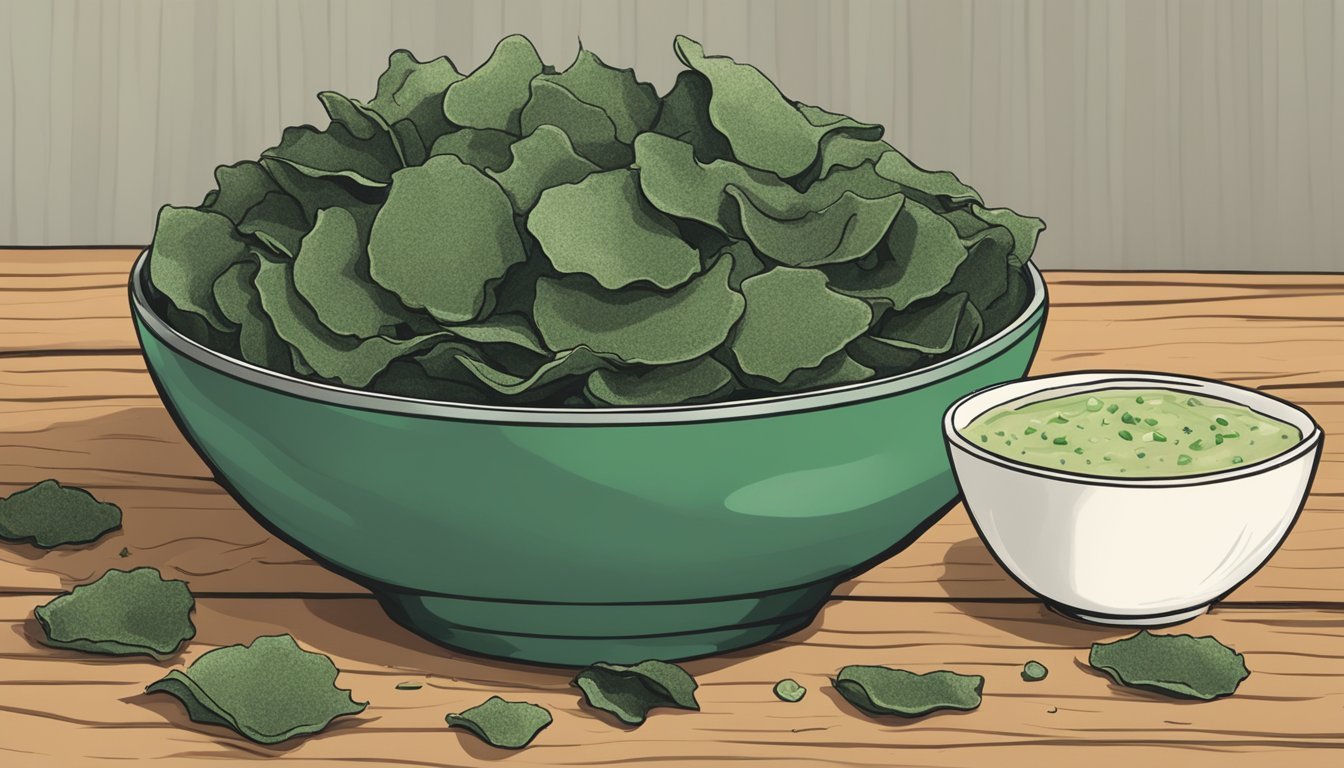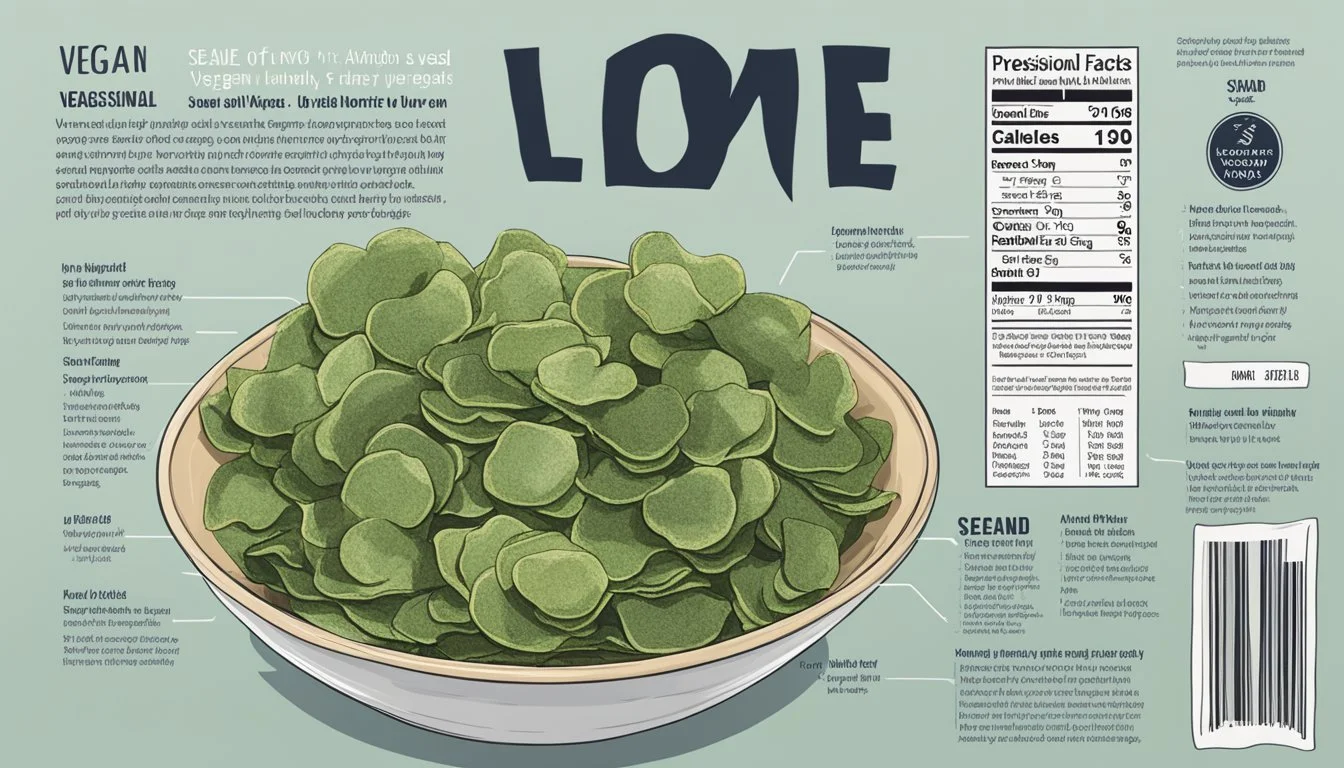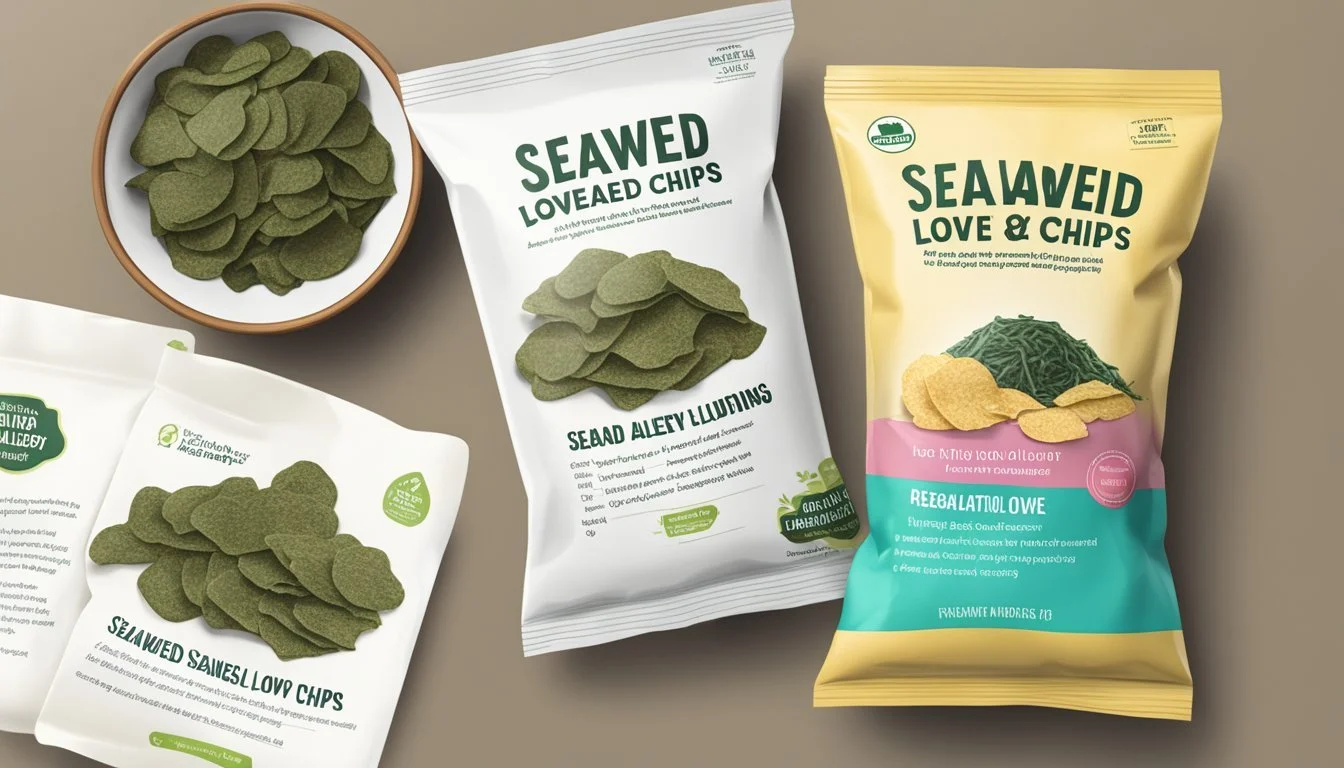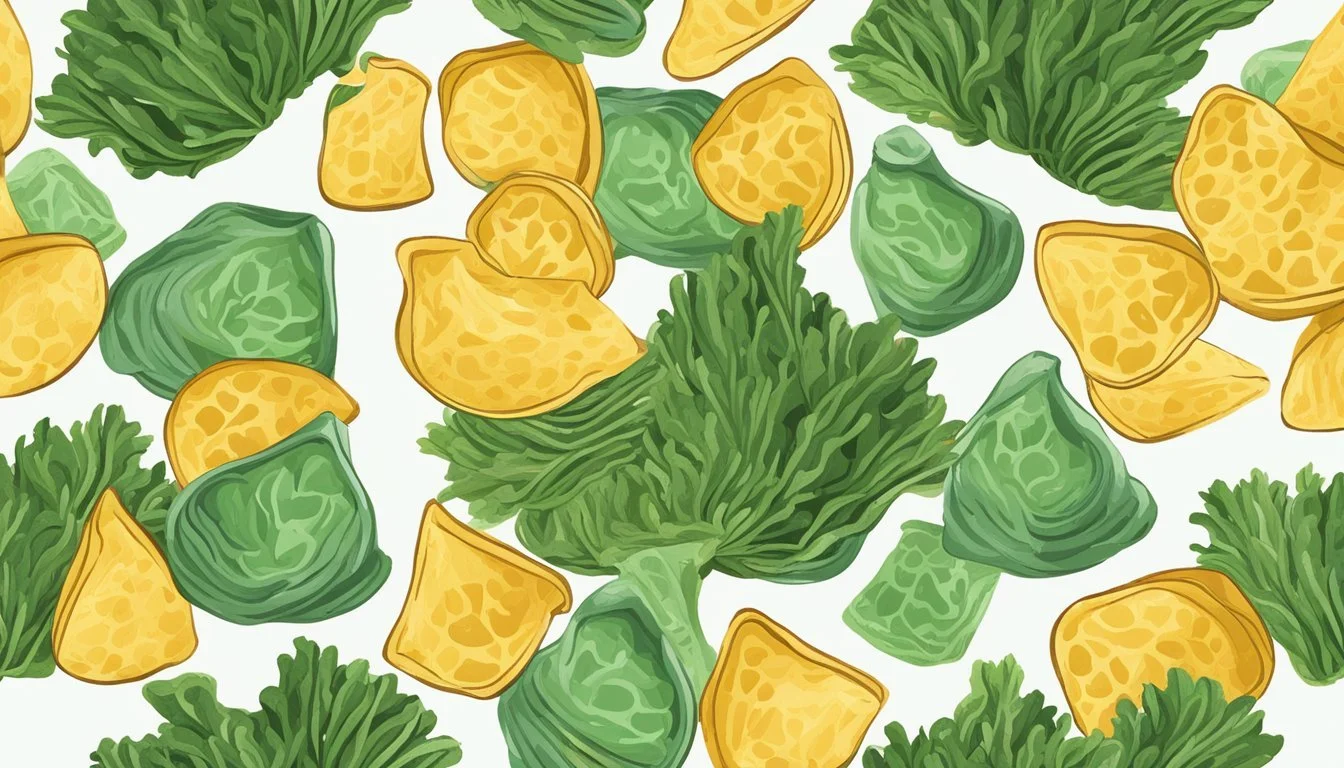Are Seaweed Love Chips Vegan?
Decoding the Ingredients for Plant-Based Dieters
Seaweed Love Chips are a vegan snack option that caters to those looking for plant-based food choices. Seaweed, the primary ingredient in these chips, is a type of algae naturally rich in nutrients, including omega-3 fatty acids and iodine, which are beneficial for a vegan diet. These chips are crafted from seaweed, making them a marine plant-based snack that's not only nutritious but also aligns with vegan dietary practices.
The vegan status of a food product relies on whether its sourcing and processing avoid the use of animal products and byproducts. Seaweed Love Chips fulfill this criterion, as the snacks (What wine goes well with snacks?) are made without any animal derivatives. Additionally, these chips are often favored by vegans for their health benefits and the suitability they offer as a cruelty-free snack alternative. However, it is important for consumers to examine the processing and packaging methods, as these can influence a product's vegan classification. While the main ingredient is vegan, additives or manufacturing processes could affect the final vegan status of seaweed-based snacks.
What Are Seaweed Love Chips?
Seaweed Love Chips are a vegan snack gaining popularity for their rich nutrient content and distinctive flavor. Made primarily from seaweed, these chips offer a healthier alternative to traditional snacks.
Origin and Popularity
Seaweed chips, also known in Japan as nori, have long been a staple in East Asian cuisines. Seaweed Love Chips capitalize on this tradition by offering a modern, snackable form of this marine vegetable. Their popularity has surged globally due to their unique umami flavor and the growing interest in plant-based diets.
Ingredients Breakdown
The primary ingredient in Seaweed Love Chips is seaweed, which is known for being rich in iodine, iron, and various vitamins. These chips typically include:
Seaweed (nori)
Salt (varies from lightly salted to other flavors)
Sunflower oil
Some variations may contain additional seasonings to enhance the umami experience.
Production Process
Seaweed Love Chips are produced through a careful process that involves harvesting the seaweed and then baking or roasting it to achieve a crispy texture. This process is designed to retain the nutrient content while creating a satisfying snack.
Flavor and Texture
With a commitment to natural ingredients, Seaweed Love Chips boast a crispy texture along with a savory umami taste. They offer a lighter, less greasy alternative to conventional snacks, with a distinctly lightly salted edge that appeals to those who enjoy subtle yet rich flavors.
Vegan Diet Basics
The vegan diet is grounded in the consumption of plant-based foods, prioritizing health, ethics, and environmental concerns. It excludes all animal products, aiming to meet nutritional needs with a diverse array of vegan ingredients.
Definition of Veganism
Veganism is a dietary and lifestyle choice that abstains from the use of animal products and by-products. People choose veganism for various reasons, including ethical concerns about animal welfare, environmental considerations, and health benefits. A vegan diet consists entirely of plant-based foods and excludes meat, dairy, eggs, and honey.
Common Vegan Ingredients
The staple ingredients in a vegan diet include a variety of veggies, fruits, whole grains, nuts, seeds, and legumes. These foods provide essential nutrients and minerals necessary for a balanced diet.
Legumes: Rich in protein and fiber, options like lentils, chickpeas, and beans are central to many vegan meals.
Tofu and Tempeh: Derived from soybeans, these ingredients are versatile and high in protein.
Nuts and Seeds: A source of healthy fats, nuts like almonds and cashews are used in a range of vegan dishes.
Veggies: The cornerstone of a vegan diet, vegetables are rich in vitamins, minerals, and fiber.
Whole Grains: Brown rice, quinoa, and barley offer complex carbohydrates and nutrients.
By incorporating these ingredients, individuals on a vegan diet can obtain a wide spectrum of nutrients to support bodily functions and maintain health.
Health and Nutrition
Seaweed Love Chips provide a healthful snack alternative, with a blend of important vitamins and minerals beneficial to anyone's diet, particularly those following a vegan lifestyle. They impact key health aspects such as metabolism and heart health, offering a rich source of plant-based nutrients.
Nutritional Benefits of Seaweed
Seaweed, the primary ingredient in Seaweed Love Chips, is rich in iodine, a necessary nutrient for thyroid function. It is also a source of vitamins like Vitamin B12 and Vitamin C, calcium, and magnesium – all vital to maintaining strong bones and general vitality. Seaweed boasts high levels of antioxidants and fiber, which contribute to gut health and can aid in weight control.
Dietary Role in Vegan Lifestyle
For those on a vegan diet, Seaweed Love Chips are an excellent plant-based snack that adds variety in terms of texture and flavor. They provide a rare natural plant-based source of omega-3 fatty acids, commonly found in fish, which are essential for reducing inflammation and supporting brain health. Also, the iron content in seaweed helps prevent anemia, a common concern in vegan diets.
Impact on Metabolism and Heart Health
The fiber in seaweed can positively affect metabolism, promoting satiety and potentially aiding in managing weight. Moreover, the natural compounds in seaweed have been found to support heart health by helping to maintain healthy blood pressure levels and providing anti-inflammatory benefits. This synergy of nutrients helps maintain an optimal balance in the body's systems, contributing to overall well-being.
Allergy and Dietary Considerations
When considering Seaweed Love Chips for a vegan diet, it's essential to scrutinize their compliance with various dietary needs and potential allergen presence. Consumers concerned with allergies or specific dietary restrictions should be aware of the ingredients and manufacturing processes involved.
Gluten-Free and Nut-Free
Seaweed Love Chips are often gluten-free and nut-free, appealing to those with celiac disease or nut allergies. The main ingredient, seaweed, naturally contains no gluten or nuts. However, one should always verify by checking the product label for mentions of gluten or nut cross-contamination.
Ingredients to look for:
Seaweed
Oil
Seasonings
Presence of Allergens and Additives
While Seaweed Love Chips primarily feature seaweed, oils, and flavorings, they may include common allergens such as soy (often found in soy sauce) and sesame seeds. Also, additives like sugar might be present. Each ingredient should be assessed for its vegan status and allergenic potential.
Common allergens and additives to check:
Soy sauce
Sesame seeds
Sugar
Cross-Contamination Risks
Cross-contamination can occur if chips are produced in facilities that also handle non-vegan foods or allergens. Manufacturers may indicate this risk on packaging, and it's crucial for consumers to review these details, especially if they have severe allergies or are strict vegans.
Cross-contamination considerations:
Shared equipment
Facility warnings
Certification labels (if any)
Seaweed Varieties and Their Uses
The diverse array of seaweed varieties offers a spectrum of tastes and textures, making them versatile for various culinary applications, from snacks to main dishes.
Comparing Different Types of Seaweed
Wakame: This is a type of brown algae often found in seaweed salad and miso soup. It has a subtly sweet flavor and a delicate texture that can enhance the taste and nutrition of dishes.
Kombu: Another variety of brown algae, kombu is typically used to make broths, contributing a deep umami flavor. It’s essential in Japanese cooking, often used to make dashi for soups like miso.
Nori: Famous for wrapping sushi rolls and making nori snacks and rice balls, nori is a type of red algae that turns dark green when dried. It is sold in sheets and has a distinctive, savory crispness.
Dulse: Dulse is a red algae with a chewy texture and a briny taste. It can be eaten raw, cooked, or dried and added to salads, wraps, and stir-fries.
Spirulina: A type of blue-green algae, spirulina is often found in powder form and is a nutrient-dense supplement that can be added to smoothies, juices, or snacks such as spirulina lemonade.
Irish Moss: Also known as carrageen, Irish moss is a type of red algae used as a thickening agent in foods and is believed to have health benefits.
Incorporating Seaweed in Other Dishes
Seaweed's versatility extends to its ability to be integrated into a wide range of dishes:
Edible Seaweed: These can be turned into seaweed snacks or added to vegan sushi and salads for a nutritional boost.
Seaweed Salad: This dish utilizes various seaweeds and is seasoned with vinegar, sesame oil, and other flavorings, making it a popular side dish.
Algae: Including spirulina and chlorella, algae can fortify food and drink products with additional nutrients.
Seaweed in Soups and Broths: Kelp and kombu are commonly used to enrich broths that form the base for soups, such as the traditional Japanese miso soup.
Seaweed Snacks: Crispy nori sheets are a satisfying, low-calorie snack alternative, often flavored with sea salt, spices, or teriyaki.
By understanding seaweed's various forms and flavors, one can confidently incorporate these sea vegetables into their cooking repertoire.
Ethical and Environmental Considerations
When exploring the vegan ethos of Seaweed Love Chips, it's instrumental to consider the ecological footprint of seaweed sourcing and the implications on marine ecosystems.
Sustainable Harvesting Practices
Harvesting of sea vegetables, when done sustainably, can be an eco-friendly activity that minimizes damage to marine biodiversity. Sustainability involves methods that prevent over-harvesting and protect the natural regrowth cycles of algae. Consumers should look for products that certify their seaweed has been responsibly harvested, maintaining the long-term health and diversity of aquatic life.
Seaweed Farming and Ocean Health
Seaweed farming stands as a green method of producing sea vegetables without extracting from wild populations. It can yield positive benefits for ocean health by providing habitats for marine species and assisting in nutrient cycling. The practice of seaweed cultivation should aim for minimal interference with local ecosystems and focus on maintaining biodiversity. Overall, Seaweed Love Chips could reflect eco-friendly principles if their seaweed sourcing aligns with these ethical environmental standards.
Culinary Tips and Recipes
Seaweed chips present a delightful crunch and a burst of ocean flavor, making them a favorite vegan treat. This section explores ways to create homemade chips, enhance them with creative serving suggestions, and guides on ingredient substitutions.
Homemade Seaweed Chips
To make Homemade Seaweed Chips, one needs to start with quality seaweed sheets. Lay the seaweed out on a baking tray and lightly brush with avocado oil for a healthy fat option, ensuring even coverage. Season with a sprinkle of salt, nutritional yeast for a cheesy umami flavor, and garlic powder for additional depth. Bake in a preheated oven until crisp, typically for about 8 to 10 minutes at 275°F (135°C), watching closely to avoid burning.
Creative Serving Suggestions
Seaweed chips can be an innovative base for canapés, replacing traditional crackers. They pair exceptionally well with cucumber, diced and tossed in lime juice for freshness. Alternatively, one might create a seaweed chip nacho platter, drizzling with a vegan mayo and lime juice dressing, and sprinkling nutritional yeast on top.
Ingredient Substitutions
In the event certain ingredients are unavailable, there are several suitable substitutions to ensure seaweed chips retain their signature taste and texture. For avocado oil, melted vegan butter can be a rich alternative. If nutritional yeast is out of reach, a dash of soy sauce or tamari can impart a similar savory note. Should there be a need to substitute lime juice, a small amount of rice vinegar mixed with water makes for a decent stand-in.
Analyzing Seaweed Love Chips' Vegan Status
When determining the vegan status of Seaweed Love Chips, the analysis must meticulously review both the ingredients used and the certifications the product holds.
Evaluation of Seaweed Love Chips Ingredients
Seaweed Love Chips list their ingredients to allow consumers to verify their compliance with a vegan diet. Key ingredients typically include:
Seaweed: This is a marine plant, rich in nutrients, utilized as the base ingredient and is inherently vegan.
Oil: Often sunflower or seaweed oil is used, which are plant-based and vegan-friendly.
Seasonings: Comprising sea salt and various vegan flavorings to enhance taste without utilizing animal products.
To affirm their vegan status, all ingredients should be plant-based and devoid of animal derivatives, dairy, eggs, or honey. In addition, cross-contamination with non-vegan items during production should be absent to cater to strict vegan standards.
Label and Certification Scrutiny
Seaweed Love Chips are scrutinized for their certification and labeling to ensure vegan authenticity:
Vegan Labeling: The presence of a vegan label on the packaging offers immediate assurance of the product's compliance with vegan standards.
Certifications: Certifications such as USDA Organic, Non-GMO, or gluten-free add another layer of credibility, though organic or Non-GMO labels do not necessarily mean vegan.
Transparency in labeling and certification allows consumers to trust that Seaweed Love Chips are not only vegan but also adhere to other dietary preferences such as gluten-free.
Conclusion
Seaweed Love Chips are considered vegan-friendly, as their primary ingredient is seaweed which is a type of algae and does not contain any animal products. These chips are a popular choice among individuals adhering to a vegan diet due to their plant-based origin.
Consumption of Seaweed Love Chips offers several health benefits. Seaweed is known to be rich in nutrients and minerals, including iodine and omega-3 fatty acids, which are essential for maintaining a healthy body.
Nutritional Value of Seaweed:
High in Iodine: Crucial for thyroid function.
Contains Omega-3s: Beneficial for heart health.
Rich in Vitamins & Minerals: Such as Vitamin C, Vitamin K, magnesium, and calcium.
It is important, however, for consumers to check the packaging and ingredients list for any non-vegan additives that may be used in specific brands of seaweed chips. The vegan status of seaweed can be compromised during processing if animal-derived substances are used.
In summary, Seaweed Love Chips can be a nutritious and vegan-compliant snack that aligns with a plant-based diet. They provide valuable nutrition and are an excellent way for vegans to include the health benefits of seaweed into their diets.











